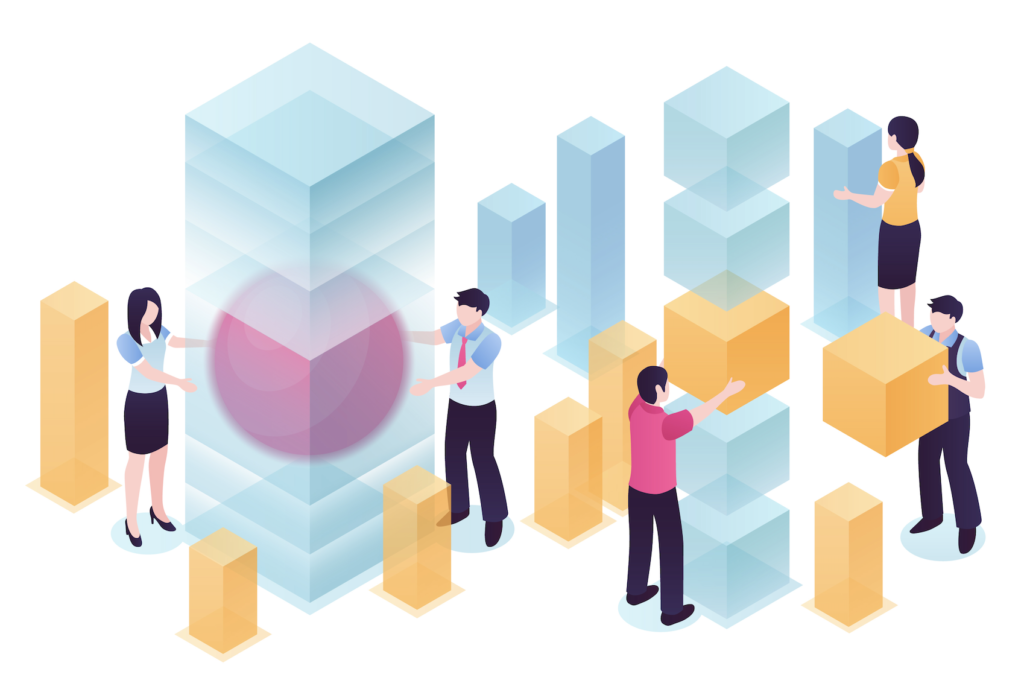The first partner meeting of the CGC-DigiTrans project (short: DigiTrans) took place on January 30 and 31, 2023 at the University of Applied Labour Studies (Hochschule der Bundesagentur für Arbeit, HdBA) in Mannheim.
The background of the DigiTrans project is the advancing digitalization and the accompanying transformation: Digital technologies have long since found their way into numerous workplaces. In order to keep pace with the digital transformation, employees need ever more pronounced digital skills. At the same time, unskilled and semi-skilled workers in particular are at risk of missing the catch-up.
The project continues the successful collaboration between the HdBA (Germany), the Universität für Weiterbildung Krems (Austria), the Università degli studi di Padova (Italy), the Saxion University of Applied Sciences (Netherlands) and the partner eMundus (Lithuania). The partners met in a hybrid format and exchanged information about the goals of the project and the work packages.
Prof. Dr. Andreas Frey, Rector of the HdBA, warmly welcomed the participants in the modern premises of the Teaching Library of the HdBA and welcomed the exchange of the partners on a European level. In his introductory speech, Prof. Dr. Frey also emphasized the importance of digitization for higher education and career guidance and counseling (CGC).
The first project day was dedicated to the European exchange: The participants got to know the partner organizations in a short portrait and gained an insight into the further vocaltional and educational training system of their partner countries.
Peter Weber then gave an informative short presentation to get those present in the mood for cooperation in the project. The aim of the project is to develop an innovative guidance method, the “CGC Roundabouts for Digital Transformation”that makes it possible:
- to identify needs of employers and customers
- to develop offers for digital qualification more closely tailored to the needs
- to select suitable qualification offers together with those seeking guidance and accompany the further training.
In order to achieve the goals, the project partners will develop and design results within the framework of various work packages over the next three years. Peter Weber, Bettina Siecke and Jenny Schulz (HdBA), who are currently working on a competence framework for digital basic vocational competencies for the second work package, provided the kick-off for the discussion on content. This framework forms the basis for the further cooperation of all partner institutions in their local networks of CGC practitioners, further vocational and educational training specialists, and HR professionals. The basis for the cooperation in the local network is both the knowledge and skills of the CGC practitioners in the context of digitization and their ability to provide guidance in multi-actor networks. The CGC-DigiTrans counseling method supports CGC practitioners to harmonize/coordinate digital competence needs of employees, companies and providers of further vocational and educational training. Accompanying the method, a method manual and an preparatory course are being developed, which will also be evaluated in the second work package.
The second day of the meeting was dedicated to work packages 3 to 5. Lea Ferrari and Teresa Sgaramella (Universita Degli Studi di Padova) described the upcoming steps in the third work package, which will start in October 2023 and will deal intensively with the implementation of the counseling method developed in the project. The inclusion of local networks of practitioners from the fields of CGC, further vocational and educational trainig and human resources in Germany, Italy, Austria and the Netherlands will ensure a high level of practical relevance and openness for adaptation in the national guidance context. Martin Stark (Universität für Weiterbildung Krems, work package 4) gave an outlook on the university curriculum to be developed and corresponding seminars, which will also pilot the new method in teaching for higher education and further training for CGC practitioners. Neringa Kelpsaite (eMundus, work package 5) presented the project homepage. In the future, all project results will successively be available on the homepage. Interested persons can view and use the report on digital competencies, the glossary on digital transformation, the method manual, application examples and the curriculum free of charge. Thomas Jäger (HdBA) and the Center for Applied Research, Development and Transfer (HdBA) rounded off the event with an introduction to the new financial framework for Erasmus+ co-funding.
The consortium is pleased with the successful project kick-off in Mannheim. The next partner meeting will take place in July 2023 in Enschede (Netherlands).
Further information:
CGC-DigiTrans is co-funded by the Eramsus+ programme of the European Union. The project runs from September 2022 to August 2025. HdBA is the coordinating institution.
For more information about the project, please visit our project homepage. Also follow us on LinkedIn. Here we will keep you up to date on the project and exciting content on the topic of “digital transformation” in the future.





Digital transformation and digital skills are gaining more and more importance for work processes and employees. Happy that this project talks about this through career guidance and counseling perspective.